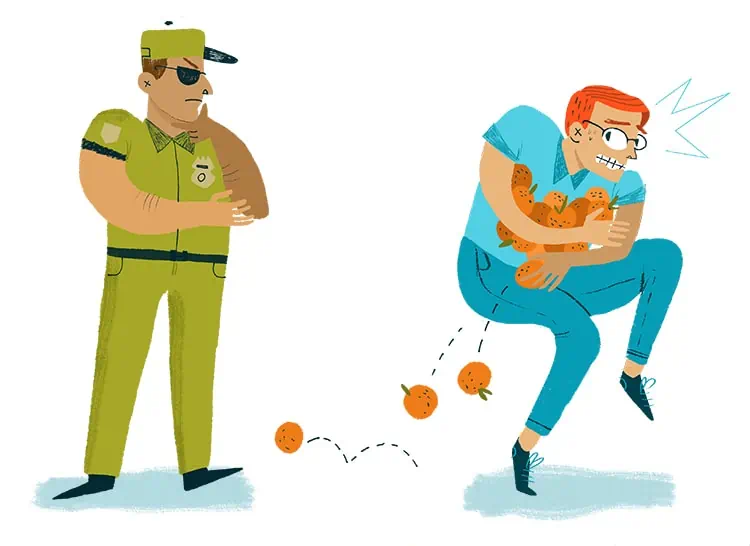Colorado has seen a tidal wave of growth in the last couple of decades. Since 2000, this Rocky Mountain playground has seen its population balloon by 1.5 million people, with most of them moving to Denver and the surrounding Front Range area. If you’re thinking of joining them, you’re in for a treat.
While the toughest thing to contend with once you get here may be the altitude, your first obstacle could be just over the state line. So you don’t lose any momentum as climb toward your new mile-high home, get the low-down on what the authorities say you can and can’t bring into Colorado.
Animals and Pets
Cats, Dogs, and Rabbits
Colorado is a great place to be if you enjoy taking your dog outdoors with you. Across the state, you’ll find countless parks, trails, and recreational facilities that are totally pooch-friendly. Just make sure you have a Certificate of Veterinary Inspection for your pup when you enter the state, along with proof that it is free from rabies and has a current rabies vaccination.
“The State of Colorado goes so far as to discourage transporting untreated firewood from one area to another within the state. They’d certainly frown upon the import of firewood from outside their borders.”
Cats require a CVI as well as rabies vaccinations. Pet rabbits require only a CVI. Take a minute though to check if there are any special requirements for your specific state of origin, for your personal furry friend.
Livestock
Statewide, Colorado has detailed and lengthy regulations regarding the import and ownership of all sorts of animals:
“No person shall possess, sell, propagate, acquire, purchase, broker, transport, trade, barter or attempt to sell, propagate, acquire, purchase, broker, trade or barter live wildlife unless such person first obtains a proper license.”
However, there is a long list of animals that are exempt from license requirements. These include small pet animals like hamsters and gerbils, and the kinds of animals you’d expect to see on a farm — 
Exotic Animals
Animals such as fish, amphibians, and certain birds fall under the “unregulated wildlife” category. And as long as you are not engaging in any sort of commercial activity with your toucan or your snake, you don’t need to go through the licensing process — at least at the time of this writing. The Parks & Wildlife Commission asserts that their efforts to balance public interest in owning exotic animals with the safety and well-being of the state are an ongoing process. Meaning, the rules may change.
If you are bringing an unusual animal into Colorado, you’d do well to check with the Colorado Division of Parks & Wildlife to make sure you’re remaining on the right side of the law.
And by the way, if you decide you don’t want that exotic animal anymore, remember that “it is unlawful to intentionally release any wildlife declared to be unregulated.” Keeping a snapping turtle may be okay, but letting one into the Colorado wild is not.
Plants And Produce
Colorado does not appear to be on par with California or Florida when it comes to restricting the import of fresh produce and house plants. We say this after finding little to no information on specific regulations or restrictions.
However, we do suggest you leave any plants that have come from a “natural environment” behind. In other words, house plants in potting soil, things you’ve grown yourself in a greenhouse, and produce from the supermarket will likely not raise any eyebrows. But trees or flowers you’ve dug up from forests or outside areas aren’t a good idea.
Firewood
The State of Colorado goes so far as to discourage transporting untreated firewood from one area to another within the state. They’d certainly frown upon the import of firewood from outside their borders.
But hey, Colorado already has plenty of trees – and plenty of firewood.
See prices for local moving labor. Read real customer reviews. Easily book your help online.
Plant quarantine
You might be wondering why Colorado (or other states) have certain restrictions on certain types of vegetation and where they come from. It’s often referred to as a “quarantine situation“. Any such circumstances can be found on the USDA quarantine states/areas page, but their main goal is to keep certain pests, fungi, or diseases from spreading.
As an example, there is an ongoing and concerted effort in Colorado to contain and eradicate the Japanese Beetle. This particular page refers to commercial nursery stock, but as private citizens, we are not exempt from doing damage to the environment we are entering. So do your part and take care when transporting your plants and produce into Colorado.
Make sure your plants are healthy and pest-free, and when in doubt, leave them behind. Any questions and concerns can be brought to the State Plant Health Director.
Firearms and Weapons
Colorado seems to be more concerned with the import of firewood than with the possession of firearms.
Colorado’s gun law states that an individual may carry a loaded pistol or revolver in his or her vehicle if “its use is for lawful protection of such person or another’s person or property.” Other weapons, however, can still be in your possession but can’t be loaded.
“It is perfectly legal to bring alcohol into Colorado…[h]owever, having an open alcoholic beverage container is illegal. This pertains not only to the driver but to all passengers in the vehicle…”
Colorado does make the distinction between concealed and open carry, favoring open carry for its gun-toting citizens, stating that “…when you carry the weapon into your home, business, hotel room, etc. it must be in plain view.” There’s also something called “interstate cooperation”. Essentially, Colorado will honor another state’s concealed carry permit, but only if that state also recognizes a concealed carry permit from Colorado.
Perhaps the most intriguing Colorado gun law regards registering your firearm. The gun law says quite plainly that, “the State of Colorado prohibits gun registration.”
Restricted Firearms
Some firearms and accessories are illegal to sell, purchase, and possess in Colorado. These items are termed “dangerous weapons” and include machine guns, sawed-off rifles and shotguns, silencers, and large-capacity ammunition magazines.

Other Weapons
This page, along with the links provided at the top, covers just about everything one moving to Colorado might need to know about what weaponry is permissible in the state. Of note: knowingly possessing a dangerous weapon is a felony, and knowingly possessing an illegal weapon is a misdemeanor. Read the statute carefully before you bring something questionable into Colorado.
Further explanations of potentially illegal acts involving firearms as well as weapons like nunchucks, throwing stars, explosive devices, and various types of bows and arrows can be found here.
Fireworks
As of July 2023, all fireworks that explode or leave the ground are banned. State laws do allow for fountains, ground spinners, sparklers, and other smaller fireworks. However, their legal use may also depend on the local municipality. Some cities and counties ban fireworks completely.
See prices for local moving labor. Read real customer reviews. Easily book your help online.
Controlled Substances
Alcohol
It is perfectly legal to bring alcohol into Colorado, as long as it is for personal consumption and falls within set quantity limits. However, having an open alcoholic beverage container is illegal. This pertains not only to the driver but to all passengers in the vehicle (with exceptions for motor homes, limousines, and the like). Note that the term “open container” includes containers that have been opened even if nothing has been consumed or otherwise removed. It likewise includes containers that are closed but have had some of the contents aready removed.
In short, just keep any alcohol you may have in the back of your vehicle, sealed, and out of reach of any passengers.
Marijuana
Interestingly, the same does not apply to marijuana. Colorado is one of several states to have legalized marijuana, and while there are plenty of limits and restrictions in place, having marijuana in your vehicle is only an offense if (a) the container is open or the seal is broken, (b) some portion of the contents have been removed, and (c) there is evidence that marijuana has been consumed within the vehicle — a standard not necessary for an open alcohol container infraction.
“…[A]s long as you are not engaging in any sort of commercial activity with your toucan or your snake, you don’t need to go through the [animal] licensing process — at least at the time of this writing.”
But when you’re physically moving to Colorado from another state, that changes things. Federal law prohibits the transport of marijuana — in any form — across state lines. You’ll have to wait until you’re here, settled, and legal to grow your own for your personal use or to purchase a small amount from a licensed dispensary.
For a rundown on the legal and illegal use, purchase, sale, and possession of marijuana in Colorado check the state’s Cannabis page.
And of course, keep in mind that the laws in your locality may be stricter than what state laws allow.
From the scene in downtown Denver to the heights of the Rocky Mountains, Colorado has a ton of fun to offer. Make sure you’re on the right side of the law when you arrive so you can jump right into it all.















